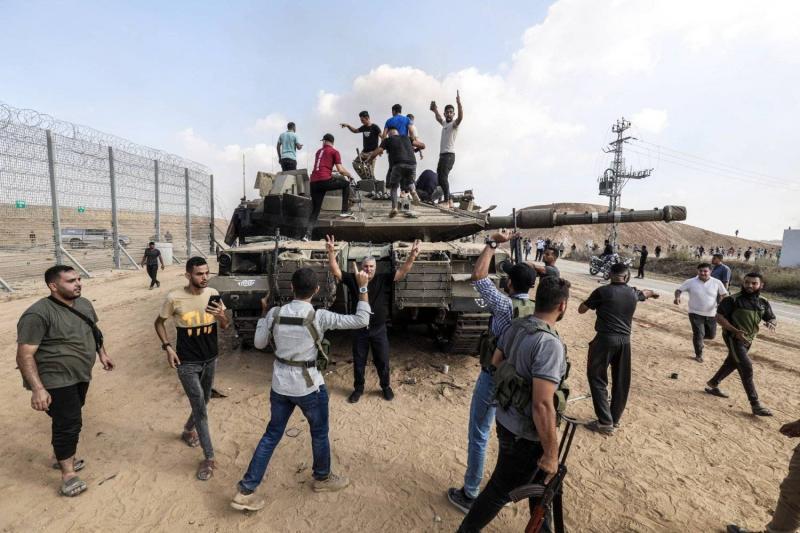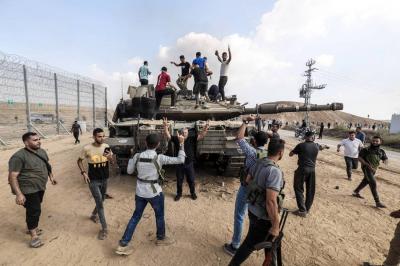It is not true what the media of the Muslim Brotherhood promotes that October 7 caused a global awakening regarding the Palestinian cause. The new global position on the Palestinian issue is primarily due to Arab diplomacy, which has subsequently reflected in the increasing recognition of the Palestinian state. Thus, it is not the student demonstrations that appeared in America and Europe that played a positive role; in fact, these had negative repercussions, as seen in the rise of the extreme European right, which has gained power and swept seats in the European Parliament.
The more ideal picture is that the majority of Western countries have recognized the depth of the crisis and the dangers posed by the Iranian militia, which has proven capable of significantly disrupting regional security, affecting global security as well. Consequently, is there a Western endeavor to bring about qualitative political transformations that could restore the political process in the region to the forefront, away from the longstanding political impasse?
This brings us to the role of the Palestinian house after the catastrophic results of October 7. Can balance be restored within this house and curb the internal division that has become deeper, reaching political discrepancies that do not seem to align with the correct calendar, in light of Hamas’s insistence on maintaining the duality of authority and arms while reproducing what it calls resistance? This trajectory has caused the deaths of over 600 Palestinians, most of whom were young people in the West Bank since October 7, in operations that Hamas described as aimed at relieving Gaza, according to the movement's statements at that time. The practicality of the field and political outcomes of this balance has been doubted.
Following the Palestinian factions’ trip to China, it appeared that the journey would yield no results similar to past agreements, starting with the 2007 Mecca Agreement, which was sponsored by the late King Abdullah bin Abdulaziz of Saudi Arabia. That agreement was ultimately stalled by Hamas’s interpretation of its terms, even though Mecca was nearby for Hamas to refer back to if it wanted to re-read and interpret its vocabulary. However, the seriousness of ending the division remained lukewarm, until the year that followed when Gaza became embroiled in the first war with Israel after the latter's withdrawal from Gaza in 2005, following the unilateral disengagement plan.
The most prominent outcome of the war that began in late 2008 was the myth of a legendary victory that was promoted illogically, even as the equation was the launching of primitive rockets at settlements surrounding Gaza, and the subsequent ceasefire was viewed by Hamas's political reasoning as an Israeli acknowledgment of the movement's existence. Consequently, the idea of marginalizing the Palestinian Authority, which emerged from the Oslo Agreement, was reinforced at the expense of reaffirming the resistance project, which essentially meant undermining the legitimacy of the Palestinian Authority and abandoning the entire political project.
This brought the issue of 17 years of division to the forefront again after October 7, renewing dialogue between the political project that successfully retrieved the Palestinian West Bank and Gaza without war, and Hamas's project, which returned Gaza under occupation with a significant difference—the immense destruction in the sector, where life has now become extremely complicated.
Thus, the idea of reopening dialogue with Hamas, initiated under the banner of the day after the war, seemed unrealistic to many Palestinian elites because the title of the dialogue primarily dealt with the political framework for governing Gaza. This is insufficient if there is not a consensus among the Palestinian factions without returning to the people of Gaza, who are the primary victims of this huge adventure. Additionally, the debate surrounding the final statement's emphasis on "unifying the Palestinian position within the framework of the Palestinian Liberation Organization, along with a commitment to establishing the Palestinian state according to United Nations resolutions," indicates that Hamas adopts the Palestinian Liberation Organization's political stance if it genuinely commits to it.
The fundamental question, as seen by others, is that Hamas appears to be hiding behind the Palestinian Liberation Organization to gain legitimacy to maintain its rule over Gaza, nothing more. The most crucial equation is in Palestinian territory; joining the Palestinian Liberation Organization is not merely agreeing to a political statement. There are concrete dimensions that Hamas cannot theoretically address, such as the triad of finances, communication, and arms. This is to avoid repeating the story of the arms in the executive force previously affiliated with Hamas in Gaza, which turned against internal security there.
Moreover, the existence of factional arms in the West Bank is a catastrophic message that undermines the Palestinian Authority's image before the international community, portraying the Authority as weak and unable to assume security responsibilities in the face of militia phenomena, which supports the arguments of opponents to the establishment of a Palestinian state while claiming it's too early to discuss it—an idea that Israel has marketed previously and continues to do so.
Thus, how can we discuss what comes after Gaza in Gaza, when the West Bank has been living under security concerns since the division in 2007 and Hamas’s control over Gaza? Regarding finances and political communications, can Hamas unveil the sources and movements of its funding, which is a fundamental pillar for its actual entry into the Palestinian Liberation Organization? Additionally, the organization typically does not oppose the political directions but is wary of diplomatic communications that could harm relations with Arab states and deepen internal political conflict, especially given its adoption of exclusionary Muslim Brotherhood ideologies. Can Hamas transcend its sectarian mindset and transform into a national movement rather than a Brotherhood entity without geography?
As for Hamas, leaks suggest that the movement is considering establishing a new political system that begins in the West Bank, aiming to create a new party that would represent the movement within the Palestinian Liberation Organization, thus declaring its adoption of its political program. However, even this idea is contingent upon amending the Palestinian Liberation Organization's charter. In other words, Hamas desires a Palestinian Liberation Organization tailored to its needs for entry, raising the question of whether the organization will remain the legitimate and sole representative of the Palestinian people as classified by the world, or whether Hamas's entry signifies the end of international recognition of the Palestinian Liberation Organization.
Consequently, will Palestinian reconciliation come, or will it remain stuck behind the Great Wall of China?




